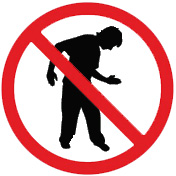 Any web savvy lawyer knows the value of the Internet Wayback Machine. This website contains a historical directory of web pages, as they appeared on a given date in time. Naturally, being able to look at the history of a website can be an extremely valuable evidence-gathering tool, and I have used it both to support arguments and to demonstrate that other parties are clearly lying.
Any web savvy lawyer knows the value of the Internet Wayback Machine. This website contains a historical directory of web pages, as they appeared on a given date in time. Naturally, being able to look at the history of a website can be an extremely valuable evidence-gathering tool, and I have used it both to support arguments and to demonstrate that other parties are clearly lying.
Web savvy cybersquatters know the power of the Wayback Machine. Accordingly, when they receive a demand letter or a UDRP complaint, cybersquatters increasingly seek to erase their web history from memory by using a “robots.txt” file – a file that instructs the Wayback Machine to not only stop collecting data on a particular domain, but to erase any existing history. It is that simple. One little file and poof! The evidence is gone.
A recent UDRP decision gives us our first insight into how domain arbitration panels may interpret this kind of behavior. See The iFranchise Group v. Jay Bean / MDNH, Inc. / Moniker Privacy Services [23658], WIPO Case No. D2007-1438.
The panel in that case observed that UDRP “Panels frequently reference the Wayback Machine in order to determine how a domain name has been used in the past.” The panel recognized that “sophisticated respondents” employ the “robots.txt” file in order to prevent access to the history of a contested domain name.
It is the opinion of the Panel that absent convincing justification for the employment of robots.txt in a given case, the use of the device may be considered as an attempt by the domain name owner and operator to block access by the panel to relevant evidence. In such a case, it is the Panel’s view that a panel is entitled to assume that reasonable factual allegations that a complainant has made as to the historical use of the web site to which the domain name at issue resolves are true and that the use of robots.txt in the particular case may be considered as an indicia of bad faith. (source)
Commentary: This is a good rule, and I believe that most ethical panels will follow it. If a party destroys evidence, it should be forced to give “convincing justification” for that destruction.
It is also good to see this kind of independent thinking by UDRP panelists and to see a panel give an opinion on an important subject, even though it might not have been a dispositive issue. Good UDRP panels engage in this kind of independent thought, to the benefit of respondents and complainants alike.
Update: It seems that the logic in this case has been picked up by at least one panel. See SCOLA v. Brian Wick d/b/a CheapYellowPages.com NAF Claim: FA0711001115109. (“In light of Respondent’s blocking of the archived versions of the Web site, the Panel will assume that Complainant’s reasonable allegations of historical use are true.”)
